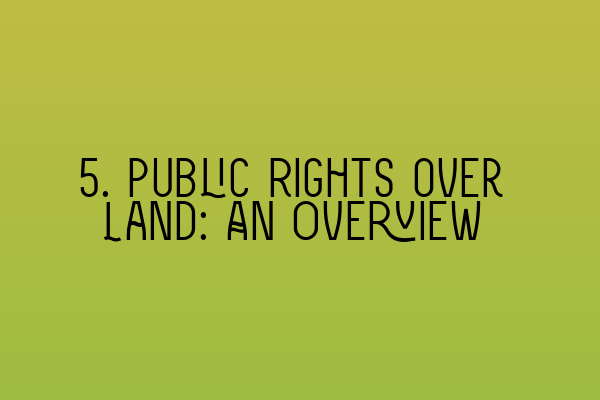Welcome to SQE Property Law & Land Law!
Are you interested in learning about public rights over land? Look no further! In this article, we will provide you with an in-depth overview of public rights over land, covering everything from access rights to the freedom to roam. So, let’s dive right in!
1. Access Rights
Access rights refer to the rights of individuals to enter and exit a particular area of land. These rights can be granted by law, custom, or even by express permission from the landowner. Access rights are essential for the public to enjoy various recreational activities such as hiking, birdwatching, and fishing.
It is important to note that access rights can vary depending on the jurisdiction and the type of land involved. For example, in England and Wales, the Right to Roam allows individuals to access certain areas of land for recreational purposes. However, this right is limited to specific types of land, such as registered common land and areas designated as open access land under the Countryside and Rights of Way Act 2000.
2. Easements
Easements are another important aspect of public rights over land. An easement is a legal right that allows a person to use the land of another for a specific purpose. It can include rights such as a right of way, right to light, or right to access utility services.
An easement is typically created through an agreement between the landowner and the person benefiting from the easement. However, in some cases, they may also be imposed by law. Easements are crucial for maintaining the functionality of infrastructure and ensuring the smooth operation of public utilities.
3. Privacy and Nuisance
Public rights over land also extend to issues of privacy and nuisance. While individuals have the right to enjoy their property without interference, there are instances where public rights may override this right.
For example, in cases where a property’s activities cause a nuisance to the public, such as noise pollution or offensive odors, the affected individuals may have the right to seek legal remedies. Similarly, public authorities may have the power to enter private property to perform necessary functions, such as making repairs or conducting inspections.
4. Planning and Development
Public rights over land play a significant role in the planning and development process. Local planning authorities have the power to regulate and control how land is used and developed to ensure that it is in the best interest of the public.
Planning permission is typically required for most development projects, such as the construction of new buildings or changes to existing structures. This ensures that any proposed development aligns with local zoning regulations, environmental considerations, and public interest.
5. Publicly Held Land
In addition to public rights over privately owned land, there is also land that is publicly held. This includes land owned by government entities, such as parks, forests, and other publicly accessible areas.
Publicly held land is often managed and maintained for the benefit of the public, providing opportunities for recreation, conservation, and education. Access to these areas is generally regulated to protect the land’s natural resources and ensure the safety of visitors.
Conclusion
Public rights over land are essential for ensuring that individuals have access to recreational activities, utilities, and public services. Understanding these rights is crucial for both landowners and the general public.
If you’re interested in studying property law or land law, we offer comprehensive SQE 1 Preparation Courses and SQE 2 Preparation Courses to help you succeed. Additionally, if you are preparing for the upcoming SRA SQE exams, we recommend checking out our SRA SQE Exam Dates for more information.
For additional practice, you can also try our SQE 1 Practice Exam Questions and SQE 1 Practice Mocks FLK1 FLK2 to enhance your knowledge and test your understanding.
We hope you found this article informative and gained a better understanding of public rights over land. If you have any further questions or would like to learn more, please don’t hesitate to contact us at SQE Property Law & Land Law.
